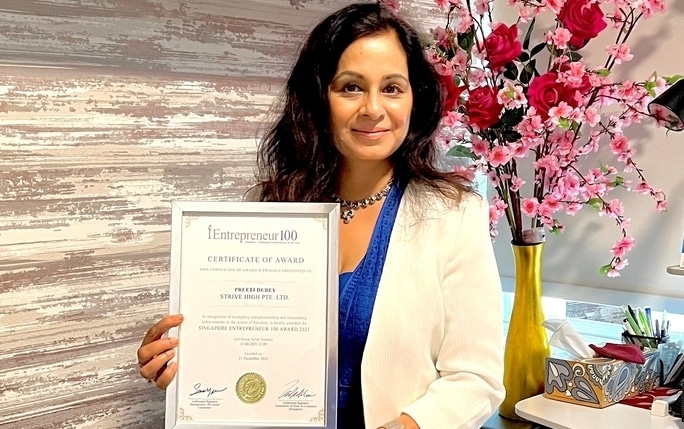Preeti Dubey (MBA 2008), member of ULMS Singapore Advisory Group, tells us about her business and the impact of the pandemic

Congratulations on your Singapore Entrepreneur 100 Award. What does this recognition mean to you?
Thanks a lot for your wishes. It means a lot to me! Every recognition is a huge encouragement as it validates the hard work we put in! It allows us to be proud of our accomplishments as a team and be grateful to all the stakeholders who have supported us.
The Singapore Entrepreneur 100 Award is offered to the selected 100 entrepreneurs in Singapore based on their corporate achievements, contributions to the industry, community, nation, and policies that have propelled the business's prosperity. It is a recognition to companies that have displayed strong business resilience and implemented sustainable economic policies while possessing commendable and proven leadership skills in steering their businesses through the COVID-19 Pandemic.
I feel immensely grateful to everyone who trusted me and supported me in my journey has contributed to our success thus far.
What are your top tips for success for any budding entrepreneurs?
Practice self-awareness and find your passion. Keep your eyes wide open and try to identify problems or needs that require addressing and how you can use your strengths to be a part of the solution. Play on your strengths and manage your weaknesses.
Be courageous and don't allow yourself to accept failure despite the numerous challenges you might face. Finally, dream! The dream should be so big that it springs you into action every morning and inspires you to do whatever it takes!
Your business Strive High offers soft solutions for tough problems. How are you working with organizations during the pandemic, to help them drive performance?
Problems remain tough until we find a solution. We are often so engrossed in the technical aspects that we overlook why the required actions are not implemented despite the right strategy and tools. The fact is that at both ends of a process, a human solves the problems, makes decisions and takes necessary actions. Humans are complex beings, and their activities depend upon what & how they think, which in turn depends on their experience and relationships with their colleagues, bosses, clients. Therefore most of the challenging problems organizations face can be traced to these soft matters that drive behaviour.
We provide 'soft solutions for tough problems' as you rightly mentioned. The process begins with identifying the pain points of the professionals and the organizations that we work with. We perform an in-depth behavioural audit to identify the gaps in the soft skills space and deliver customized learning and development solutions. Our training solutions include a combination of individual coaching and training workshops.
Soft skills training was mainly accepted as "in-person" as it addresses issues pertaining to human interaction. The Covid pandemic halted all in-person exchanges, which meant putting a full stop to our business unless we changed our modus operandi. We quickly turned the adversity into opportunity by reaching out to our clients with online training solutions. We made them see the value online training could bring in terms of reaching out to different cross-functional teams located globally on the same platform at the same time! Which became easier as the pandemic made online training not only acceptable but a new norm. Besides, there are several issues that employees were grappling with due to sudden changes in working style and the uncertainty and ambiguity that Covid brought to people's professional and personal lives.
Are you seeing any emerging problems as a result of the pandemic?
Covid has pushed everyone into unchartered waters, and we are all trying to find our way. Everything has changed, from how we work and live and balancing work and life. New challenges emerge as the online or hybrid form becomes the new norm. Some of the pressing issues organizations face are driving engagement, nurturing relationships, and building trust, especially when uncertainty and ambiguity are at unprecedented levels. It is challenging to develop new relationships and build a rapport with them, whether with a co-worker or a new client. Communication within the organizations is mainly limited to online and is highly target-oriented to enhance efficiency. There is little room for small talk or cooler side chats, making it difficult for workplace relationships to become stronger and more sustainable. Such practices can have long-term effects that can be very damaging if not addressed. There is a risk that gradually, it will deplete feelings of belongingness to each other and the organization. It is challenging to gauge the temperature of the work environment and identify which team member is feeling the chill and needs to be warmed up with care and empathy, or perhaps require some support and guidance. It is no surprise that the organizations are facing the issue of mass resignations. If organizations fail to address these soft issues, they will have a tough journey ahead!
Are there any tips you can give our alumni for maintaining a positive mindset and continuing professional development during these challenging times?
When rapid change is the new normal, we need to be agile, resilient and persistent to make our dreams come true. Learn to be uncomfortable, constantly challenge yourself. Pay attention to your pain points; those are the growth spurts hurting to germinate. Make learning and development your success mantra, prepare yourself for the upcoming challenges, and never shy away from hard work. As the saying goes, "in life, you don't get what you wish for; you get what you work for." Strive High, don't live a life less than what you deserve!